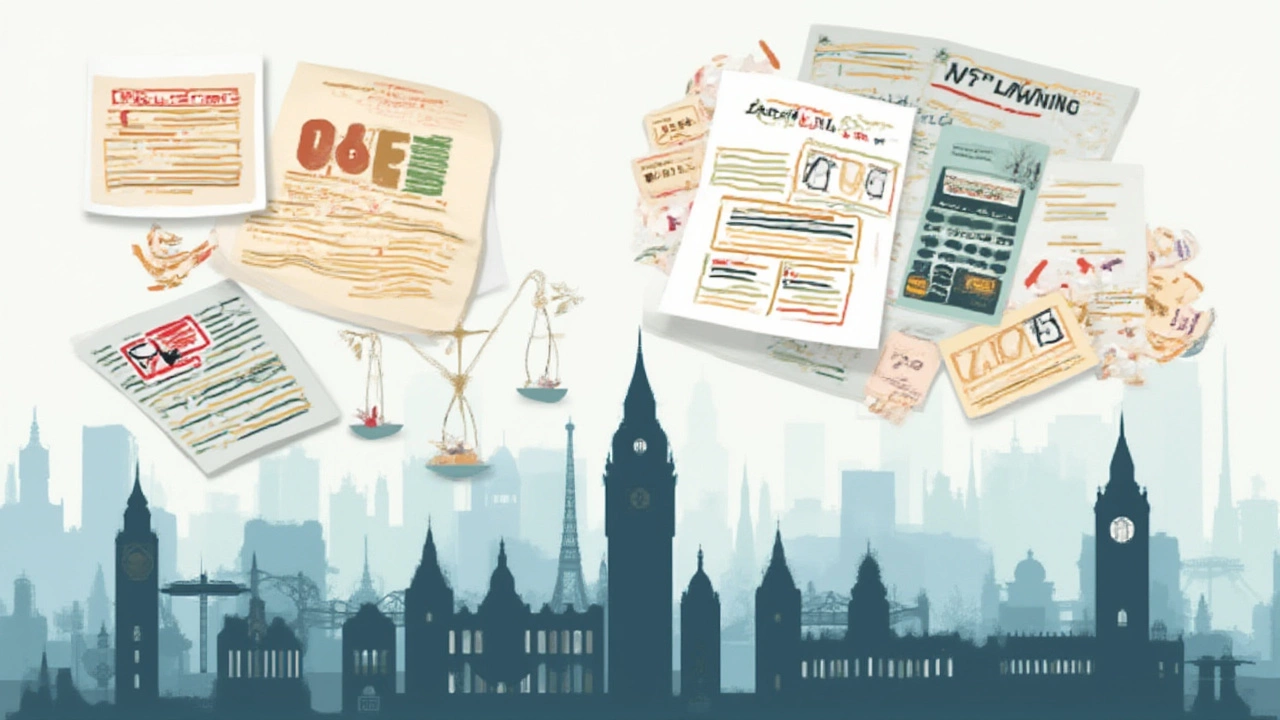Picture this: you open a new bakery on your high street, pouring your savings into shiny ovens and wooden tables. But is your little shop classed as a commercial property? Or maybe you've got a garage at the back to store supplies—does that count too? Figuring out what’s genuinely ‘commercial’ isn’t always as obvious as it should be. The line between someone’s side hustle and a full-scale business operation can get blurry. Yet, the difference isn’t just semantic—it affects your business rates, planning permission, insurance, and even how you pay tax. If you've ever looked at all those For Sale signs and thought, "Which of those are commercial?", you’re definitely not alone.
Defining Commercial Property: Not Just Shops and Offices
People often assume ‘commercial’ only covers big glass office blocks or the local Tesco Express, but the official definition goes way beyond that. In the UK, a property is called ‘commercial’ when it’s used to generate profit—basically, any building or land used for business purposes rather than as a home. This might sound straightforward, but let’s get into the real-world details. We’re talking shops, factories, warehouses, bars and restaurants, gyms, hotels, even cinemas and car parks. That tiny single-room barber shop tucked between two houses? Commercial. The giant Amazon fulfilment hub off the M62? Definitely commercial. But here’s where it gets interesting: any building that’s mixed-use—say, a corner shop with a flat upstairs—can be partly commercial and partly residential. The law slices them up into different classifications, so the ground floor is taxed and regulated as business space, while the flat above counts as someone’s home.
‘Commercial property’ isn’t just about the building—sometimes it’s the land itself. If you’ve got a field that’s been rezoned for storage or a car lot, the planning permission and the declared use change how it’s treated. Even car boot sales running every Sunday can bring a chunk of land into the commercial bracket. The actual definition comes from a stack of legal documents, but the most important is the Land Use Classes Order. In England, this splits every bit of property into use classes, like Class E (general business use), Class B2 (industrial), or Class F1 (schools and galleries). Planners and surveyors love these codes, but for most people, it just means any place where business happens, not sleeping or living. Sometimes the dividing line gets fuzzy. For example, short-term Airbnb lets in residential homes rarely count as ‘commercial’, but a hotel or guesthouse definitely does. Office spaces converted into micro-apartments might slip into the grey zone too, and councils are constantly arguing about which way they lean.
The differences don’t just matter to town planners—they change your bills. Business rates hit commercial buildings, often with a vengeance, while homeowners dodge that bullet. Insurance is stricter (and pricier) for business premises, partly because of risks like fire or theft of valuable stock. Try getting a commercial mortgage on a warehouse and the numbers spiral way past a standard residential loan. As of 2025, the UK government values all commercial property on a register managed by the Valuation Office Agency, and they use real sale data to adjust rates and taxes yearly. In 2023, the average annual business rates bill for UK shops was around £12,000, while some larger supermarkets paid millions. It’s a big deal if you’re thinking of buying, selling, or leasing any kind of business premises.
Commercial property gets its own rules during and after construction. Building codes (or Building Regulations) set stricter fire exits, accessibility features, energy efficiency targets, and waste disposal standards for business spaces. Air conditioning or special ventilation for certain industries? Required by law. Even a small sandwich shop needs to follow kitchen health and safety regulations that wouldn’t apply in a regular house. Miss something during your build or renovation, and you can face eye-watering fines or even forced closure.

Why the Commercial Label Matters for Businesses and Owners
Getting the commercial tag slapped on a property is about way more than just labelling your building. Everything trickles down from that single word: how much council tax you pay, what kind of insurance you need, and whether you need planning permission to convert space or add a sign outside. This isn’t just paperwork—ignore these distinctions, and you might lose your business overnight. For instance, running a cafe from a residential kitchen breaches planning law and can rack up legal bills fast. On the flip side, if you’re letting out a flat as a shop or office without changing the class, you can end up with void insurance or even be prosecuted.
Mortgages work differently for commercial property compared to buying a house. Lenders expect bigger deposits—think 25–40%, not the usual 5–10% for homes. You’ll need business plans, trading accounts, and those all-important projections. The interest rates are higher, and the loan terms shorter. Some of the biggest high street banks, like Barclays and NatWest, specialise in loans for UK businesses that want to buy or develop commercial premises, but they’ll grill you harder than Gordon Ramsay on a bad day. One surprising fact: you might get a break on Stamp Duty Land Tax when buying certain small business properties under £150,000, as the government offers relief for qualifying businesses. But step over that price, or if your business is too large, and you pay the full rate just like any property investor.
Business rates (the tax on commercial premises) are the hot potato. In England and Wales alone, business rates brought in more than £25 billion in 2023. Every council sets rates based on an official ‘rateable value’, decided by the rental value if your property was let on the open market as of a certain date. Restaurants, office blocks, garages—all get different rates based on size, location, facilities, and usage. There are tons of reliefs available: small businesses can get up to 100% relief if the property’s rateable value is below £12,000. But the devil’s in the details. Get your use class wrong, miss a planning change, or forget to challenge your rateable value, and you could end up paying thousands more than a neighbour in a similar building.
Then there’s VAT. Selling, leasing, or subletting commercial property is often subject to 20% VAT unless it’s an older building, which might be exempt or carry a reduced rate. Property investors can ‘opt to tax’ which allows them to reclaim VAT but means their tenants have to shoulder extra costs too. Confusing? Hugely. Plenty of business owners hire specialist accountants or surveyors just to keep this side straight—especially with tax rules in constant flux post-Brexit, and new rules likely arriving in 2025 as the government tries to squeeze more revenue from property.
If you’re a tenant, the lease terms in commercial property are something else entirely. Forget those rolling, easy-break home tenancies. Leases for warehouses or offices typically last five, ten, even 25 years, and you’ll often be liable for repairs—right down to the plaster and parking area. Councils and private landlords alike demand rent reviews, and they’ll push up prices mid-lease unless you’ve got watertight clauses. This is why hiring a commercial property lawyer isn’t just a smart move—sometimes, it’s the only way to avoid bankruptcy over a missed clause.
Take a look at the breakdown of how properties are taxed and regulated in this commercial property context:
| Property Type | Tax Type | Business Rates (Avg) | Use Class (England) |
|---|---|---|---|
| Shop | Business Rates | £12,000/year | Class E |
| Office | Business Rates | £24,000/year | Class E |
| Warehouse | Business Rates | £18,000/year | Class B8 |
| Factory | Business Rates | £25,000/year | Class B2 |
| Restaurant | Business Rates + VAT | £15,000/year | Class E |
Even advertising on your site—like putting up a billboard or a commercial sign—needs council permission if you’re in a conservation area, and some have heavy penalties if you don’t comply. And if you want to run a business from your house? Most of the time, you’re fine if it’s just you and a laptop. Turn your living room into a dentist’s office, or start daily lorry deliveries, though, and you’re tiptoeing firmly into commercial territory. Councils can investigate and even force closure if neighbours complain or the extra traffic gets out of hand.

Checks, Tips and Pitfalls: Navigating Commercial Property Rules
The property world is full of horror stories about people misunderstanding what counts as ‘commercial’. Before putting down any serious money, always check the existing use class with your local council’s planning department. A property listed as a ‘shop’ (Class E) can’t be turned into a factory without full planning permission. Changing use illegally or without proper paperwork can not only halt your business dreams but leave you on the hook for thousands in fines. Councils have ramped up spot checks since 2022, partly to chase up more business rates, so documentation matters more now than ever.
Insurance is another pitfall. Regular home insurance rarely covers business activities—try running a consulting agency from your spare bedroom and making lots of in-person client visits, and you’ll discover the hard way your claim might be invalid. If property is classed as commercial, you need special business insurance, and small print always matters: loss of income, public liability, employers’ liability, contents, and buildings cover. Always check with a broker used to commercial policies, not just a residential broker fobbing you off.
Unsure if a place is commercial? Ask for the title register or deeds, which record any planning restrictions or historic uses. Land Registry records in England and Wales are public and show special covenants or prior changes of use. Many savvy investors trawl these for information before making an offer. If you’re really not sure, a specialist surveyor can provide a quick report, and their advice can be worth its weight in gold. They’ll weigh up practical things: separate access points, fire safety features, loading bays, and the location of utilities—all clues to its intended use.
Tax is the silent killer in property deals. If you’re the owner, stamp duty tax calculations get complicated fast. Anything over £150,000 bears the higher commercial rate. There are different VAT rules for sales and leases; you might qualify for capital allowances if you install new equipment or environmental improvements, but deadlines and rules change year by year. Property tax relief and allowances can save you a fortune—but only if you file the right paperwork on time. The Government’s guidance on gov.uk is detailed, but hard to read for the average buyer. Most business owners talk to accountants who specialise in commercial property. By 2025, software like Xero, Quickbooks, and FreeAgent all offer property-specific tax tracking tools. Using these, especially if you’re a landlord with multiple units, keeps you compliant and saves you hours of paperwork headaches come April.
Now, if you’re a tenant, don’t just look at the basic rent. Check for service charges, obligations to repair, and whether the landlord can pass on tax hikes. In the UK, it’s common for landlords to pass external repairs, roof maintenance, and even insurance costs to tenants through ‘full repairing and insuring’ leases—an expensive surprise for new business owners. Talk to a lawyer before you sign anything, and never take verbal promises at face value. Survey the building yourself: check for asbestos, dodgy wiring, fire exits, escape routes, and whether the premises are up to code. Non-compliance falls on your head, not your landlord’s, once you take occupation.
- If you’re planning to buy or lease commercial premises, start by researching the use class with your council.
- Speak to a surveyor for a condition report before paying any deposit.
- Get a commercial mortgage quote from at least three lenders.
- Talk to an accountant about tax reliefs, business rates, and VAT, especially for multi-use buildings.
- Always get insurance quotes tailored to the business type—and check the exclusions line by line.
- Document all repairs, alterations, and planning permissions from day one—these build up your asset value over time and can save you from legal disputes later.
The world of commercial property seems built on paperwork and legalese designed to trip you up. But once you crack the code on what’s classed as ‘commercial’, all those complicated rules actually make your business more robust. If you treat commercial property like just another house, you’ll get burned—plain and simple. Pay attention to the use class, sharpen up on local council rules, and keep good records. You’ll save yourself from most of those horror stories before they even start.
